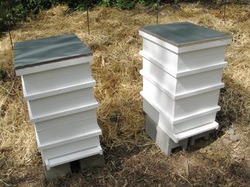
It has been said of bees that they are the most perfect of any insect in the way they live, and the most valuable on account of the work they do. There are thousands of plants that rely on the bees to perpetuate them and bring forth fruit. About 30-40% of the food we eat is dependant upon bees for their pollination. As many people know, bee populations have dramatically decreased over the last 20-30 years. Farmers often rent hives of bees from beekeepers to ensure pollination of their crops. The price of honey is increasing and the demand for raw honey is increasing as people learn of the many benefits and uses for good quality, local, raw honey.
As a micro-business idea, beekeeping is one that may work for some. To start up a hive, the cost could range from a few hundred dollars to just under a thousand- depending on how resourceful one is as well as how much equipment is desired. It is a good idea to have a mentor, someone local who could help guide a new beekeeper in this adventure. There are many books on the market for beginning beekeepers as well as a lot of material online. In some areas, there may also be a beekeepers club.
One hive can grow into two or three hives in a year, thus making it possible to easily grow the business. One hive yields about 75 pounds of honey, as well as wax and propolis- other saleable bee products. Renting out beehives is actually where the money is mostly made. One hive could yield between $10-$180 depending on the season as well as the crop that needs to be pollinated. The California almond crop alone requires more than half the commercial bee colonies in the nation.
Some excellent books for beginning beekeepers may include: The Beekeepers Handbook, Beekeeping for Fun & Profit, and The Backyard Beekeeper. Any of these books will give you an excellent description of bee anatomy, hive life, pests and other problems, beehive equipment, and beehive maintenance along with other important information. These books can be found on Amazon, at bookstores and maybe even at your local library.
Beekeeping is not for the weak at heart, however. Those with allergies or phobias need not apply. It also takes dedication and hard work. Beekeeping is usually taken up as a hobby (micro business). However, if you are considering a micro-business and have a place to keep bees, consider beekeeping. Below are some excellent links to further beekeeping resources.
http://extension.missouri.edu/publications/DisplayPub.aspx?P=G7600
http://www.beehiverules.info/category/beekeeping
http://www.ca.uky.edu/entomology/news/ent41.pdf
http://www.dadant.com/catalog/
http://www.mannlakeltd.com/


 RSS Feed
RSS Feed

